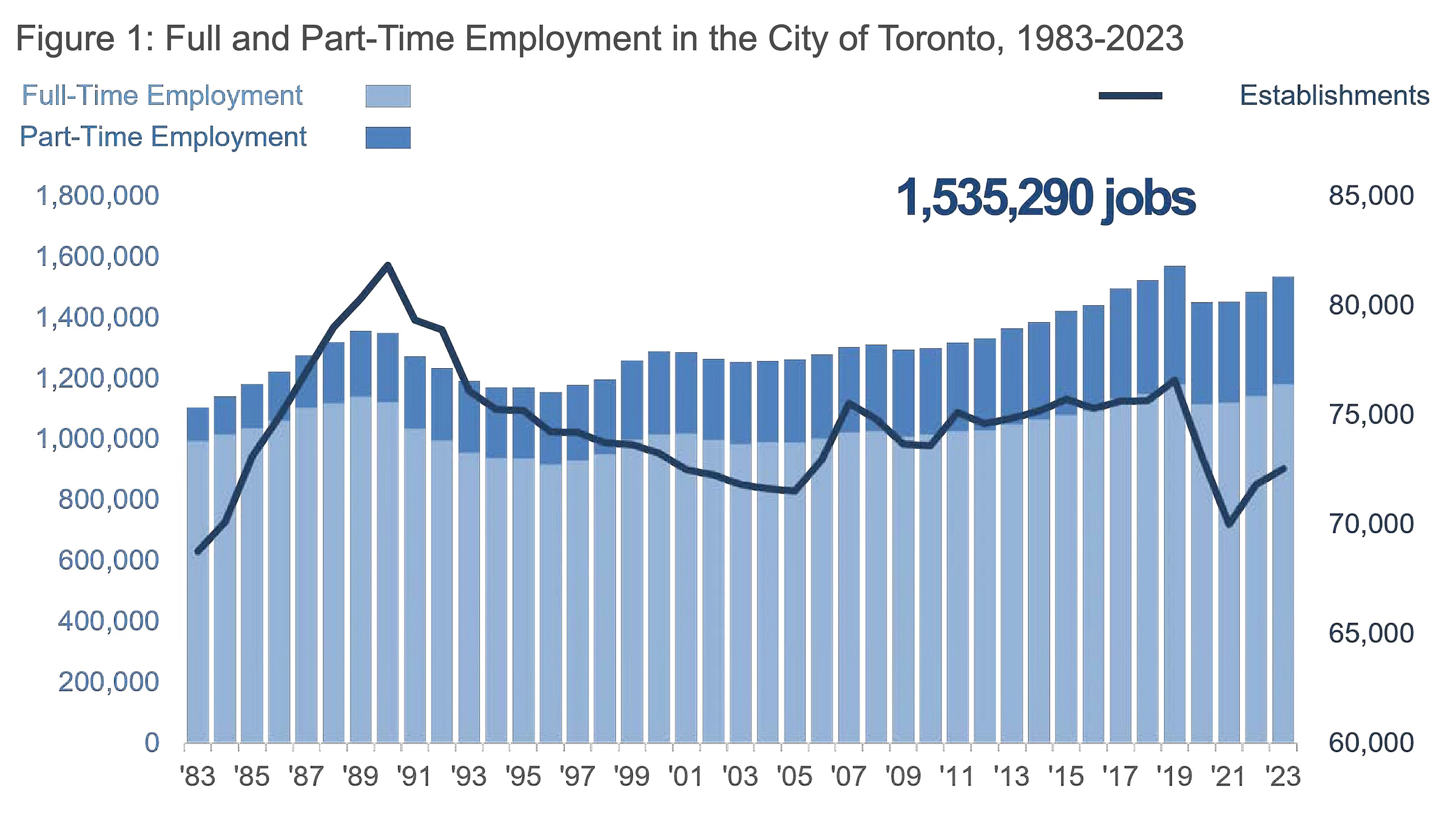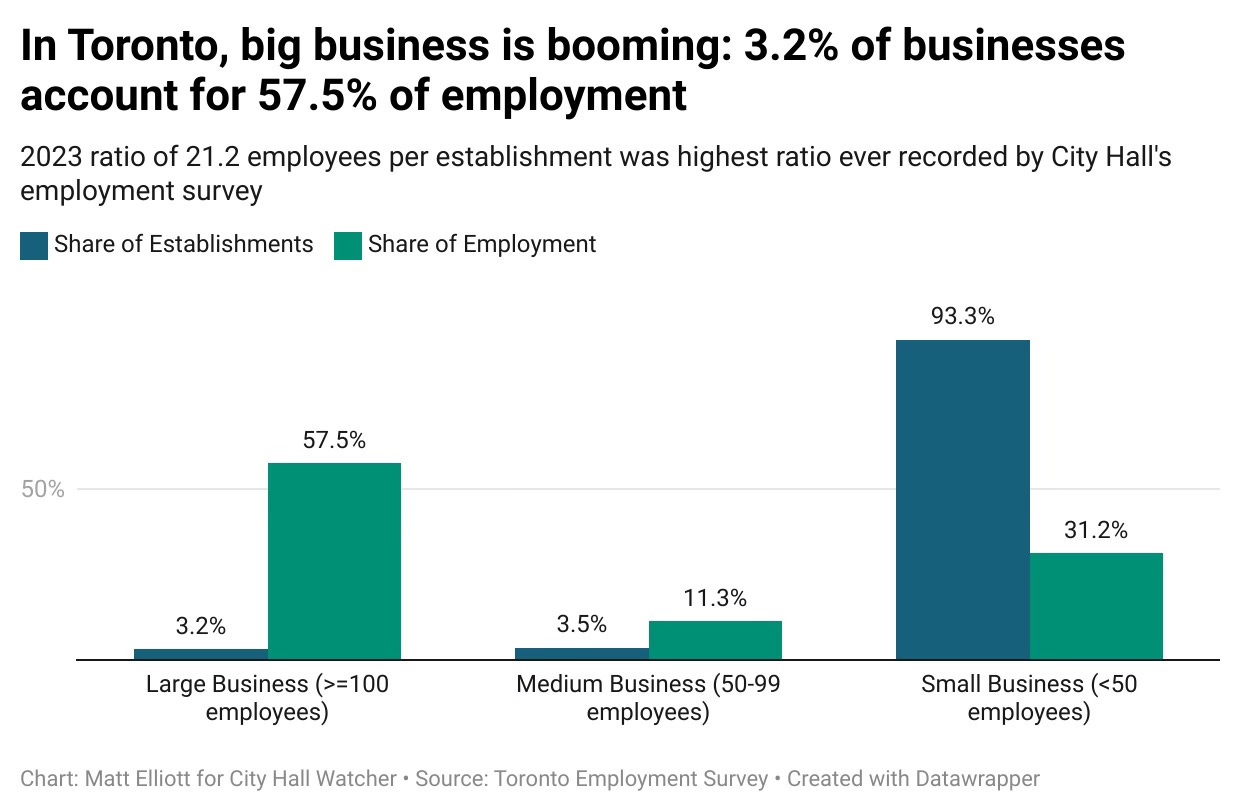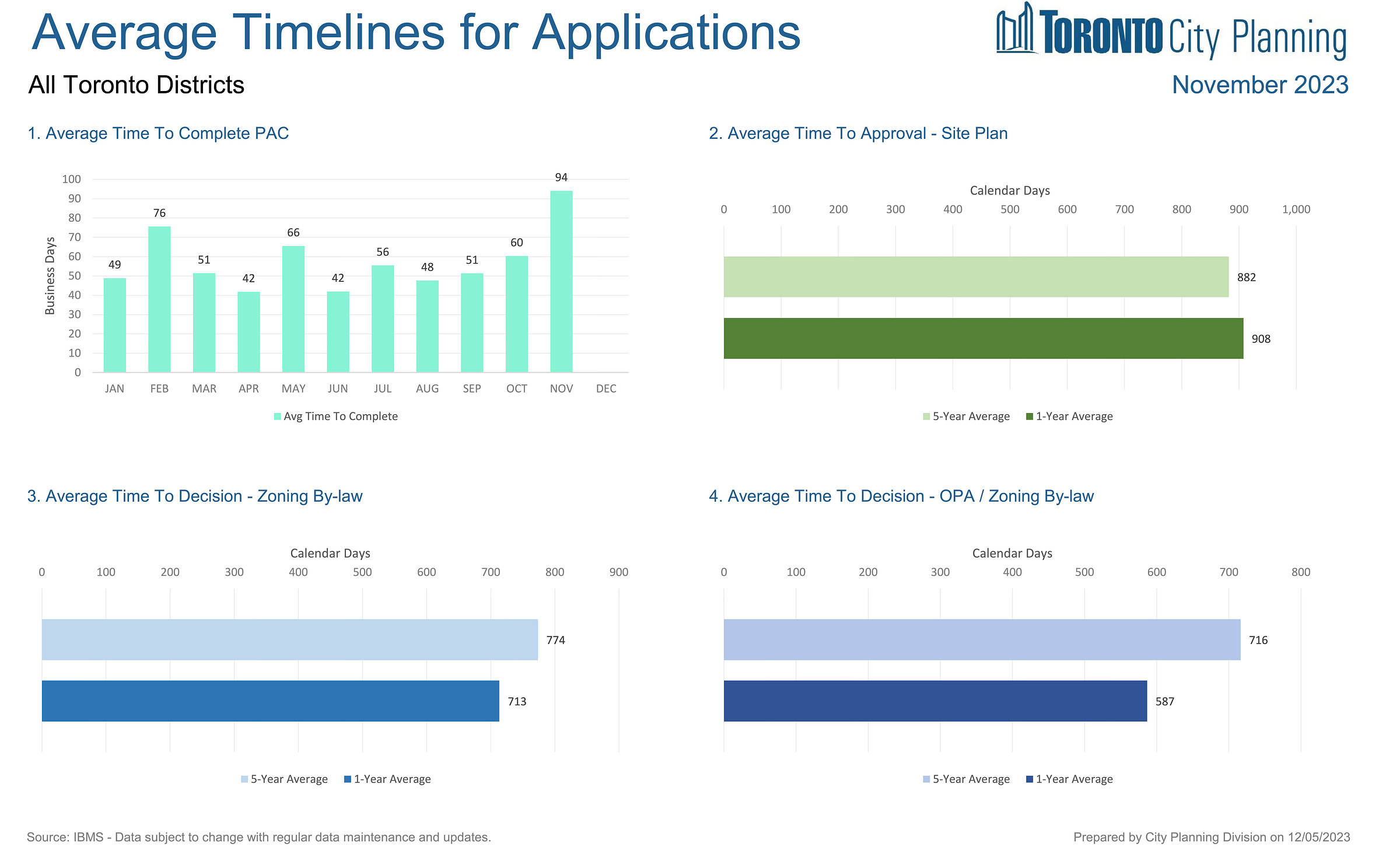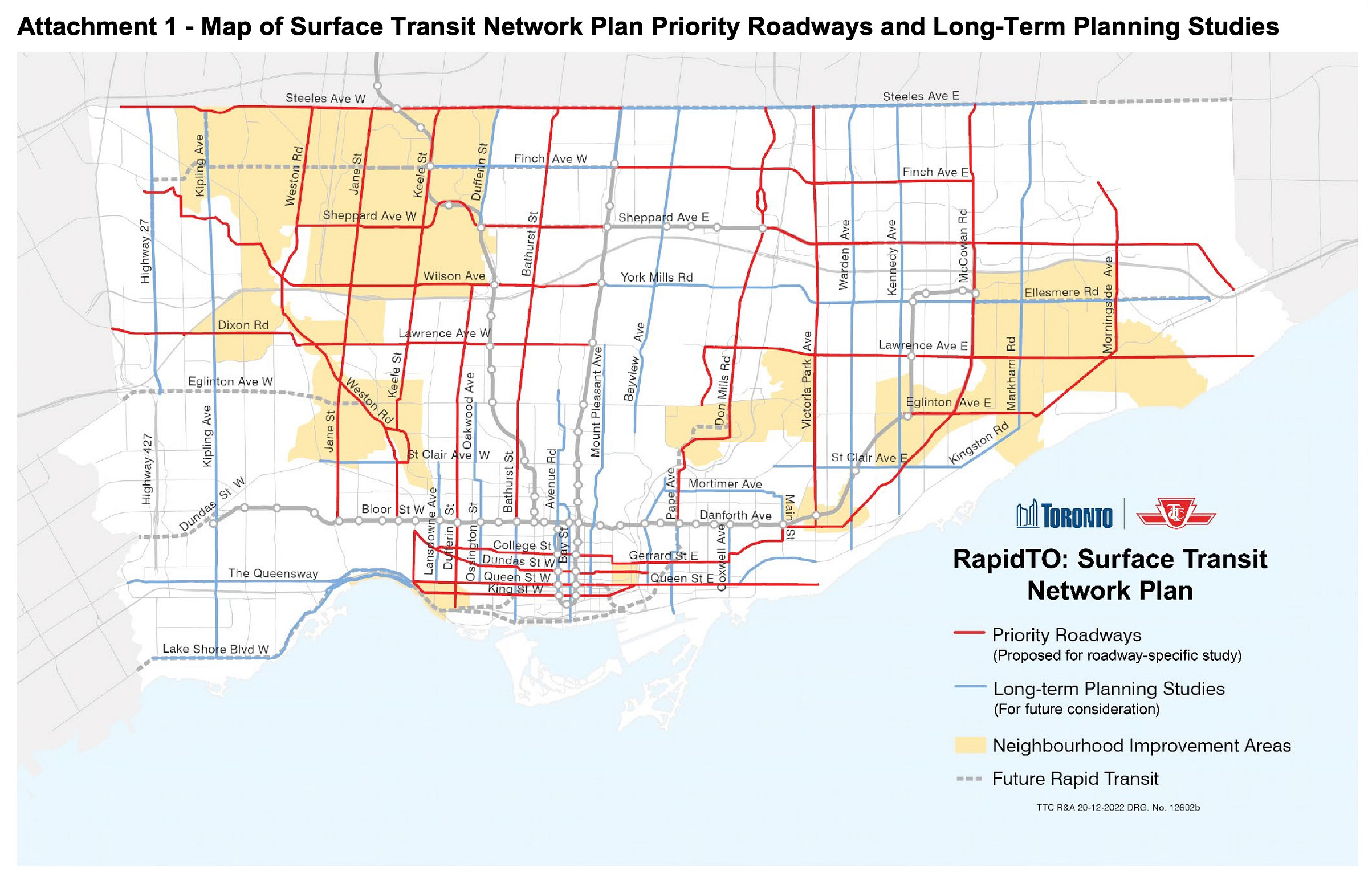Toronto Budget 2024 (Olivia's Version) drops next week
The Week at Toronto City Hall for the week of January 29 through February 2, 2024 grapples with fact that 3% of businesses account for 58% of employment, plus Mayor Olivia Chow presents her budget
Hey there! The Budget Season is already nearing its end. Sometimes, it feels like it’s over before it starts. Mayor Olivia Chow will present her recommended version of the budget next Thursday. Also on committee agendas: a municipal tax on foreign buyers, speeding up the planning pipeline, and dedicated bus lanes — where the transit can be fast, but the process is usually slow. — Matt Elliott
This issue of City Hall Watcher’s The Week at Toronto City Hall is sponsored by:
Monday, January 29
🏘️ The Planning & Housing Committee meets at City Hall at 9:30 a.m.👀 Watch Live: Committee Room 1, YouTube LivestreamTORONTO’S BIG BUSINESS BOOM: Toronto’s Employment Survey for 2023 is out and is — as usual — great reading.
There’s some good news here for post-pandemic economic recovery. The City counted 72,530 businesses last year, up 1.1% from 2022. After losing 3,110 establishments in the previous five years — primarily due to the pandemic — the report says we’ve recovered 60% of what was lost.
Still, establishment growth is not keeping up with employment growth, leading to a Toronto economy that is increasingly skewed toward bigger companies.
If this trend continues, it could have some real political ramifications, as Toronto’s economic success will increasingly hinge on a few large corporations maintaining a presence in the city.
The Office category (49.9%) and Institutional (18.4%) account for more than two-thirds of employment, which represents another municipal challenge as those categories have the highest share of remote-work arrangements with employees, leading to “uneven demand on the transportation system and for service and retail uses patronized by office workers.”
The report notes that office occupancy is currently highest on Wednesday, at a very nice 69% of desks in use. As you’d expect, it was lowest on Friday, when offices are only 33% full.
NEED FOR SPEED: If Toronto is going to treat housing like an emergency, then it makes sense to measure response times. Next week’s Planning & Housing Committee sees the 2024 debut of a pair of dashboards designed to regularly report progress.
The results are… mixed. Metrics for Development Review Timelines show the average time to complete the Pre-Application Consultation (PAC) Process increased significantly from previous months in November 2023. The report blames “delayed scheduling of PAC meeting requests received over the summer months.” The average time for approval of a site plan in 2023 was also high compared to the five-year average.
Zoning bylaw decisions were faster last year than the five-year average, though, so there’s reason for some optimism.
But still, the numbers confirm that the city is still taking nearly two-and-a-half years to get to site plan approval. Seems like there’s room for improvement.
There is also a separate dashboard that tracks big affordable housing projects. Of 35 priority sites comprising 2,781 affordable units, 26 projects are progressing, while seven are on hold. Two are listed as “requires attention.” Needy.
One thing critics tend to blame for slowing down the planning process is the requirement for developers to do community consultations. In another report, staff have laid out a new process for consultation that they say will fit within new provincial deadline requirements.
The new process is kind of creative, in that it tackles the problem of not having enough time within the new 30-day deadline to hold a community meeting by scheduling the meeting before the 30-day deadline begins.
But before the new community consultation process is implemented, staff recommend that City Hall, well, consult. This is a consultation about consultations. It’s consultation inception.
AND ALSO:
Councillor Dianne Saxe wants the multi-tenant housing bylaw (otherwise known as the rooming house) to apply to fraternities and sororities. They’re currently exempt.
There’s a set of updated zoning bylaws for midtown — a part of the city that has generally been resistant to adding density.
📚 The Toronto Public Library Board meets at the Reference Library at 6 p.m.👀 Watch Live: Reference Library Boardroom, WebEx SAFETY BY THE BOOK: The Library Board will consider a report on safety and security at library branches. The context is that 2023 saw the highest number of incidents of the last decade, with the number of recorded safety incidents in 2023 up 71% from 2022 and a whopping 419% from 2014.
The report notes that the library’s 2024 submission includes funding for four “Library Safety Specialists” and more security guards. The library has also deployed washroom sensors designed by Brave Co-op at the Reference Library. The sensor sends an alert if a washroom has been occupied for a while, but no movement has been detected.
AND ALSO:
There will be a verbal update on the library’s recovery from the ransomware attack last year.
Tuesday, January 30
🗄️ The Executive Committee meets at City Hall at 9:30 a.m.👀 Watch Live: Committee Room 1, YouTube LivestreamMayor Olivia Chow’s cabinet-like Executive Committee will consider a report recommending City Hall implement a 10% tax on foreign real estate buyers, starting in 2025.
Aside from the rate — the provincial tax is currently 25% — the proposal is to mirror the provincial foreign buyer tax, implemented in 2017. That tax has generated amounts as high as $200 million per year. However, the final revenue amount could be lower due to a provision that allows buyers to seek a rebate if they become permanent residents within four years of their purchase.
Toronto real estate has been consistently responsible for between 40% and 50% of total revenue. Still, there is no revenue share agreement that flows any of this tax money to the municipal government, so this new proposal effectively wills a revenue share into existence.
City Hall’s take-home from the tax will depend greatly on whether the federal government extends their outright ban on foreign buyers beyond the December 31, 2024 expiration date. But even if they do, the City expects to generate some revenue, as the federal ban has exemptions like allowing international students to buy properties for $500,000 or less. While most city real estate has blown past that price point, there are still a bunch of tiny one-room condos available.
With no federal ban in place, City CFO Stephen Conforti’s report says City Hall can expect to generate up to $15 million a year. With the federal ban, the estimate is still $9.6 million per year.
INACTIVE IMAGINATION: In 2020, developer Cadillac Fairview made an application to City Hall’s terribly-named Imagination, Manufacturing, Innovation & Technology Program to receive $230 million in public grants toward three office buildings they’re planning to build in their East Harbour development at the bottom of Broadview Avenue.
The City’s response? Request DENIED.
The reasons offered include a City belief that decreased demand for office space and challenges with transit construction will delay construction beyond the suggested 2024-2028 construction timeline. Maybe way beyond.
In addition, the report notes that with projects like flood protection, the Ontario Line, a SmartTrack station and a coming extension of Broadview Avenue, there’s already been a ton of what amounts to government subsidy for these developments.
Cadillac Fairview shouldn’t take it too personally, though. The rejection comes at the same time the Executive Committee will consider a report suggesting staff redesign — and hopefully rename — the IMIT program, significantly reducing the scope and amount of subsidies available to developers.
One key suggestion: making office buildings ineligible for the grant.
The IMIT program has paid out grants to 74 projects since 2008, totalling $729 million in public spending. Staff say this generated $1.3 billion in property tax revenue that wouldn’t have existed otherwise, though it’s hard to prove that these projects wouldn’t have gone forward anyway.
[Corrected Jan 26: The property tax revenue was previously listed incorrectly due to a typo that replaced “billion” with “million.” Small error, big impact! I regret the error — ME]
RAPID, EVENTUALLY: Transportation Staff are recommending the Committee — and later Council — endorse a vision for a “Surface Transit Network Plan,” with a bunch of identified priority routes where the City could install dedicated bus lanes or other infrastructure upgrades to prioritize transit.
This RapidTO plan isn’t moving too quick, though. The committee will be asked to advance three specific routes: Finch East, Dufferin Street, and Lawrence East. The report lays out a process for those three routes that could take between three and five years to go through consultation, design and implementation.
Bus priority on Jane Street, approved in 2021, has also seen delays. A report on implementation is now due in Q2 of this year. And Steeles West seems to have been left out entirely. There’s no mention of any date for further reports on that route.
Previously, in City Hall Watcher:
For paid subscribers to City Hall Watcher, this week’s issue has:
A guest contribution from Damien Moule comparing the cost of a subway infrastructure project in Toronto with the cost of a very similar project in Paris, France. Why are Toronto transit projects so darn expensive? City Hall Watcher investigates.
A chart of estimated per-capita spending in Toronto’s budgets
Next week:
The Budget Committee wraps up its work on the 2024 plan. A look at what we know — and what’s next — ahead of the mayor’s budget release on Thursday.
Subscribe now to get instant access to the City Hall Watcher archives and all future subscriber-exclusive, ad-free Monday issues.
Wednesday, January 31
🏳️🌈🏳️⚧️ The Two-Spirit, Lesbian, Gay, Bisexual, Transgender and Queer Advisory Committee meets at City Hall at 9:30 a.m.👀 Watch Live: Committee Room 2, YouTube Livestream A NEW HOPE: A report to the committee reveals that the long overdue and much-delayed replacement for the City’s recreation program booking system is planned for launch in Q4 of this year. Could the era of the quarterly Hunger Games-style battle to secure swimming lessons spot be coming to an end?
The committee is being asked for advice on how the new system will collect gender data.
🏆 The Bid Award Panel meets at City Hall at 2 p.m.BID AWARD PANEL CONTRACT AWARD OF THE WEEK: up to $28.3 million for tree planting.
Thursday, February 1
💸 Mayor Olivia Chow will unveil her version of the 2024 budget.I’ll have details on any changes and announcements on Mastodon and BlueSky.
Friday, February 2
🎢 The Board of Governors of Exhibition Place meets at Beanfield Centre at 9:30 a.m.PLACE FOR PEOPLE: The current Ex board will consider a consultant’s report on transportation through the Exhibition Grounds, which includes an early-stage plan to pedestrianize some streets around BMO Field, the Better Living Centre, and the Horse Palace.
👉 The Civic Appointments Committee meets at City Hall at 9:30 a.m.THEATRICAL & WATERFRONT GIGS: The committee will ponder people who might be good picks for the TO Live Board of Directors — responsible for overseeing the City’s theatres — and the Ports Toronto board.
🪧 The Sign Variance Committee meets at City Hall at 9:30 a.m.SIGN OF THE TIMES: After they failed to win approval in September, billboard profferer Outfront Media is back at committee for a second attempt at locating a new digital billboard at 9 Hanna Ave. It’s the site of a Toronto Police Collision Reporting Centre, and located just off the Gardiner.
The police continue to support the billboard — in part because they’ve been promised they’ll be able to use the digital space 10% of the time to broadcast community safety messages — but staff are again advising the committee to reject it.
The Week After Next
Council’s next regular meeting kicks off on Tuesday, February 6. Most non-budget items covered above will be up for final approval at that meeting. You can also probably expect what’ll probably be a pretty silly debate about Toronto’s “toboggan ban.”
The Far-Flung Future
A special Council meeting to consider Mayor Olivia Chow’s 2024 budget is set for Valentine’s Day — February 14. Prepare a sonnet.
Feedback? Tip? Email Matt Elliott. For advertising inquiries, email Sean Hansel.









Two things:
1) Not sure if this is your wheelhouse but I would love to see you some reporting on the (non)enforcement of the King Street rapid streetcar program since it would be very relevant to other rapid bus lanes. The rapid bus lanes are an essential, brilliant, low-cost Transit solution and absolutely should be implemented. However, they will make no difference at all if they are not enforced. The King Street project was a terrific success initially but, due to a lack of enforcement, we seem to be right back where we started.
2) As a paid subscriber, I have no issue seeing ads in your substack but I really really really wish they weren't from companies like Uber!
I don't really love the uber ads. do what you need to to monetize, i guess. but perception goes a
long way-especially in a substack who's credibility is so well-earned.
makes me wonder if CHW would be compromised in providing any supplemental info about uber and/or references to related substacks analyzing their super duper power plays in the halls of city hall or queen's park (e.g., what's going on in other municipalities and jurisdictions). kinda weird, matt reports on uber's lobbying activities and then uber determines it's a viable advertising medium to sway a group of fairly dedicated city hall followers that there are mistruths abound. CHW = increases transparency and discussion on city hall politics and then advertises on behalf of the most prolific lobbyists. weird and yucky